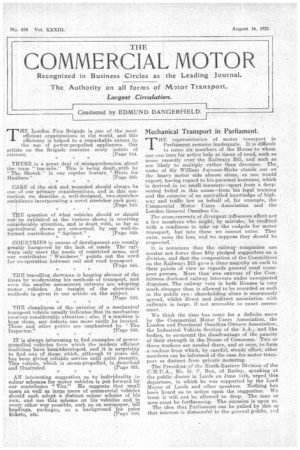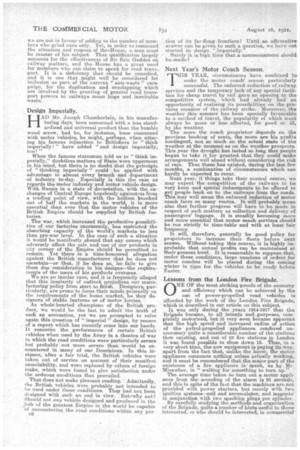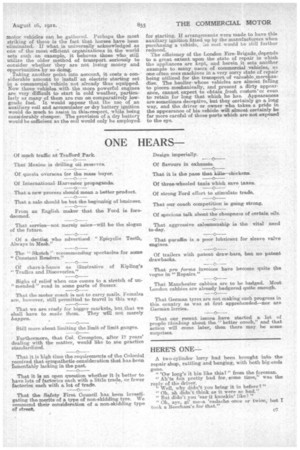Mechanical Transport in Parliament.
Page 1

Page 2

Page 3

If you've noticed an error in this article please click here to report it so we can fix it.
HE representation of Motor • transport in Parliament remains inadequate. It is difficult to name six members Of the' House to whom . one canturn for active help at times of need, such as arose recently over. the Railways Bill, and such as are likely tomultiply rather than decrease. The name of Sir William joynson-Hicks stands out on the heavy motor side almost alone, as one would expect, having regard to his personal keenness, which is derived -in no small measure—apart from a deepseated belief in this cause—from his legal training and the ekercise of an unrivalled knowledge of highway and traffic law on behalf of, for example, the Commercial Motor Users . Association and the London General Omnibus Co.
The cross-currents, of divergent infltiences affect not a few menibers, who might, by mistake, be Credited with a readiness to take up the cudgels for motor transport, but into these we cannot enter. They exist, none the less, and we suppose they should be respected.
It is notorious that. the railway companies can muster not fewer than fifty pledged supporters on a division, and that-the composition of the Committees on the Railways Bill gave a clear majority on each to their points of view as -regards general road trans. pert pow-era. More than one canvass of the Committees disclosed railway interests under unexpected disguises-The railway .vote in both Houses is very much stronger than is allowed to be recorded as such in the public eye: shareholding alone is enormously spread, whilst direct and indirect association with railways is large, if not amenable to exact assess sment. • We think the time has come for a definite move by the Commercial Motor Users Association, the London and Provincial Omnibus Owners Association, the Industrial-VehicleSection of the A.A.,and like bodies, to surmount the disadvantage .of. the paucity of their strength-in the Houae of Commons.' Two or three workers are needed there and at once, to form nucleus from Which; by, careful, steady' effort, other members can be informed of the case for motor transport as distinct from private motoring.
The Presidentsof the North-Eastern Division of the .C.M.U.A., Mr. G. E. Box, of Batley, speaking at the public dinner in Leeds on June 14th, urged -this departure, in which he was supported by the Lord Mayor of Leeds and other speakers. Nothing has been heard as to action upon the suggestion. We trust it will not be allowed to drop. The man or men must be forthcoming. The occasion is upon us. The idea. that Parliament can be pulled by this or that interest is distasteful to the general public, and we are not in favour of adding to the number of Meinberg who grind axes only. Yet, in order to command the attention and respect. of the•House, a man must be master of his subject That qualification largely accounts for the effectiveness of Sir Eric Geddes on railway matters, and the House has a great need for members who can claim to speak for road trans-, port. It is a deficiency that should be remedied, and it is one that might well be considered for inclusion as part of the current "anti-waste " -campaign. for the duplication and overlapping which are involved by the. granting of general road transport powers to railways mean huge and inevitable waste.
Design Imperially.
HAD Mr. Joseph Chamberlain, in his manufacturing days, been concerned with a less. standardized and universal product than the humble wood screw, had he, for instance, been concerned with motor vehicles, he might, perhaps, when uttering his famous injunction to Britishers to "think imperially ! " have added "and design imperially, too! "
When the famous statesman told us to "think imperially," doubtless matters of State were uppermost. in his mind, but there is no doubt that the, principle of "thinking imperially" could be applied with advantage to almost every branch and ,department of industry to-day. Especially is this the case as regards the motor industry and motor vehicle design. With Russia in a state of devastation, with the exchanges of Central Europe hopelessly againstais from a trading point of view, with the bottom knocked out of half the markets in the world, it is more essential than ever that the motor vehicles of the British Empire should be supplied by British fac tories. .
The war, which increased the productive possibilities of our fattories enormously, has restricted the absorbing capacity of the world's markets to less than pre-war level. In the case of such a situation it would be manifestly absurd that any causes which adversely affect the sale and use of our products in any corner of the Empire should be permitted to remain. Yet there is a time-honoured allegation against the British manufacturer that he does not ascertain—or that, if he does so,. he fails to give them due consideration in his designs—the reqttireinents of the users of his products overseas. We are an insular race, and it is frequently alleged that this insularity of outlook prejudices our manufacturing policy from start to finish. Designers.? particularly, are prone to focus their minds primarily on the requirements of the home market, be they designers of stable lanterns or of motor lorries. As whole-hearted champions of the British product, we would be the last to admit the truth of such an accusation, yet we are prompted to raise again this question of " imperial ' design, by reason of a report which has recently come into our hands. It concerns the performance •of certain British vehicles when used by the Army in a theatre of war in which the road conditions were particularly severe but probably not more severe than would be encountered in many of our Dominions. In this in-stance, after a fair trial, the British vehicles were taken out of service on account of their manifest unsuitability, and were replaced by others of foreign make, which were found to give satisfaction under the arduous conditions that prevailed.
That does not make pleasant reading. Admittedly, the British vehicles were probably not intended to be used under those conditions. They bad not been designed with such an end in view. But;why not? Should not arty vehicle designed and produced in the hub of the greatest Empire in the world be capable of encountering the road conditions within any por e° . tion of its far-flung frontiers? Until an affirmative answer can be given to such a question, ye have not started to. design " imperially."
Surely it is high time that a commencement should be made?
Next Year's Motor Coach Season. .
THIS YEAR, circumstances have combined to make the motor coach/ season particularly successful. The enforced reduction of railway, services and the temporary lack of any special facilities for cheap travel by rail gave an opening to the competitive system, which had already had an opportunity of realizing its possibilities on the previous occasion of the railway strike. Moreover, the weather this summer has been specially favourable to a method of travel, the popularity of which must always be more or less affected, for good or ill, by the weather. The more the coach proprietor depends on the previous booking of seats, the more are his profits contingent, not so much on the actual state of the weather at the moment as on the weather prospects. This year the drought has lasted so long that people began to take it for granted that they could make arrangements well ahead without considering the risk of rain. Thus there has existed, during the last few months, a combination of circumstances which can hardly be expected to recur.
Next year, if things take their normal course, we may expect the. competition of the railways to be very keen and special inducements to be offered to get people back on to the railways from the roads. This may well mean. the enforced reduction of motor coach fares on many routes. It will probably mean also that further progress will have to be made in respect of such matters as collection and delivery of passengers' luggage. It is steadily becoming more and more essential that motor math services should be run strictly to time-table and with at least fair frequency.
It will, therefore, generally be good policy for proprietors to increase their fleets before next season. Without taking this course, it is highly improbable that annual profits can be maintained at their present level. It is reasonable to suppose that., under these conditions, large numbers of orders for motor coaches will be placed during the coming winter in time for the vehicles to be ready before Easter.
Lessons from the London Fire Brigade.
ONE OF the most striking proofs of the economy and efficiency which can be achieved by the use of power-propelled road vehicles is afforded by the work of the London Fire Brigade, which is described in our article on this subject. It was only during the years 1914-1917 that the Brigade became, to all intents and purposes, completely motorized, but it very soon became apparent that the high speed and increased radius of action of the petrol-propelled appliances rendered unnecessary quite a considerable number of the stations then existing, and out of 83 fire stations in London it was found possible to close down 15. Thus in a
th
very short time, e new equipment is paying its way, apart from the fact that, unlike the horse, the motor appliance consumes nothing unless actually working, and it must be remembered that the major part of the existence of a fire appliance is spent, as by Mr. Micamber, in "waiting for something to turn up." The average time taken to turn out a. motor appliance from the sounding of the alarm is 9.-k seconds, and this in spite of the fact that the machines are, not provided with power starters, but merely with two ignition systems—coil and accumulator, and magneto' in conjunction with two sparking plugs per cylinder.
By carefully studying the methods and organization of the Brigade, quite a number of hints useful to those interested, or who should be interested, in commercial
motor vehicle's can be gathered. Perhaps the most striking of these is the fact that horses have been eliminated. If what is universally acknowledged as one of the most efficient organizations in the world sets such an example, it behoves those who still utilize the older method of transport seriously to consider whether they are not losing money and opportimities-by se doing. Taking another point into account, it costs a considera,ble amount to install an electric starting set in a commercial vehicle not already thus equipped. Now those vehicles with the more powerful engines are very difficult to start in cold weather, particularly as many of them are run on comparatively lowgrade fuel. It would appear that the use of an auxiliary coil and accumulator or dry battery ignition would do much to assist in thisirespect, while being considerably cheaper. The provision of a dry battery would be sufficient as the coil would only be employed. for starting. If arrangements were made to have this auxiliary ignition fitted up by the manufacturers when purchasing a vehicle, -;se cost would he still further reduced.
The efficiency of the London Fire, Brigade, depends to a great extent upon the state of repair in which the appliances are kept, and herein it sets another example to many users of commercial vehicles, as one often sees machines in a very sorry state of repair being utilized for the transport of valusibleemerchandise. The haulier, whose vehicles are almost falling to pieces mechanically, and present a dirty appearance, cannot expect to obtain fresh custom•or even to retain for long that which he has. Appearances are sometimes deceptive, but they certainly go a long way, and the driver or owner who takes, a pride in the appearance of his vehicle will almost certainly be far more careful of those parts which are not exposed to the eye.
































